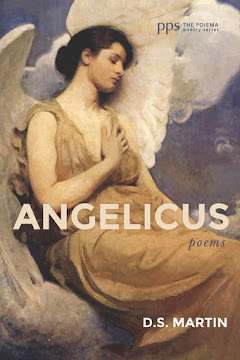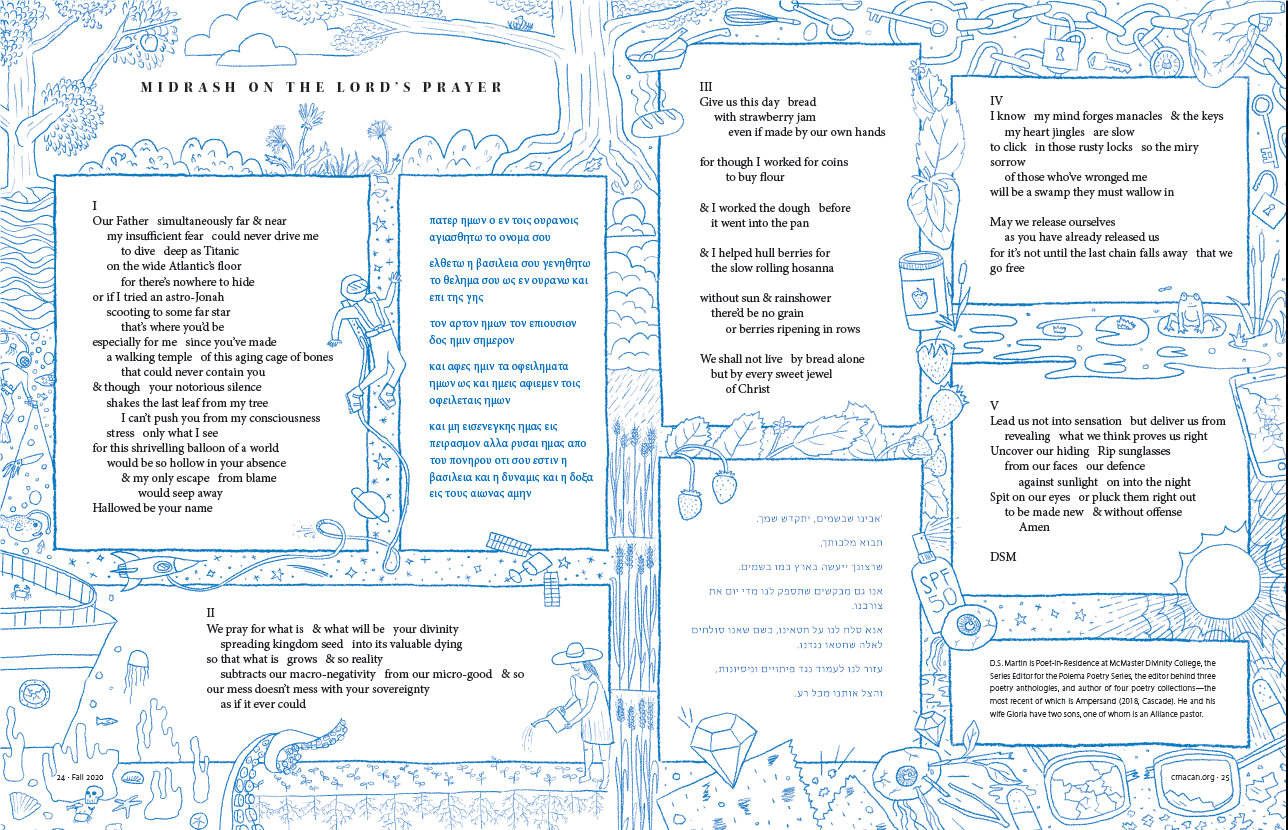Malcolm Guite teaches at the Faculty of Divinity at Cambridge University, and is chaplain at Girton College, Cambridge. He is a well-respected Christian poet and scholar ― having written critical pieces such as Mariner: A Theological Voyage with Samuel Taylor Coleridge (2018, IVP Academic), edited poetry anthologies, and had several collections of his own work published. His newest poetry book is After Prayer: New Sonnets and Other Poems (2019, Canterbury).
He has also collaborated with artists in other genres ― particularly inspiring Canadians such as singer Steve Bell (CD Keening For the Dawn), and visual artist Faye Hall who created 63 images illuminating 63 lines of his poetry for the book Seven Whole Days (2017, Castle Quay Books).
The following link presents Malcolm reading his poem “As If” , augmented with a visual climb along vines, through a fruit tree, and into an atrium at Regent College where Guite was the featured speaker for the 2019 Laing Lectures. His topic being: Imagining the Kingdom.
The following poem is from his collection Sounding the Seasons.
A Sonnet for Palm Sunday
Now to the gate of my Jerusalem,
The seething holy city of my heart,
The Saviour comes. But will I welcome him?
Oh crowds of easy feelings make a start;
They raise their hands, get caught up in the singing,
And think the battle won. Too soon they’ll find
The challenge, the reversal he is bringing
Changes their tune. I know what lies behind
The surface flourish that so quickly fades;
Self-interest, and fearful guardedness,
The hardness of the heart, its barricades,
And at the core, the dreadful emptiness
Of a perverted temple. Jesus, come
Break my resistance and make me your home.
Posted with permission of the poet.
*This is the third Kingdom Poets post about Malcolm Guite: first post, second post.
Entry written by D.S. Martin. His latest poetry collection is Ampersand (2018, Cascade). His books are available through Amazon, and Wipf & Stock, including the anthologies The Turning Aside, and Adam, Eve, & the Riders of the Apocalypse.
Monday, March 30, 2020
Monday, March 23, 2020
Veniamin Blazhenny
Veniamin Blazhenny (1921―1999) is a Russian-language poet who was born in a small Jewish village in Belarus. His literary pseudonym, "Blazhenny" is said to suggest both “Fool for Christ” and "Blessed". He corresponded with Boris Pasternak, sending him some of his early poetry ― although his poems remained unpublished until the late 1980s, due to censorship and the limited publishing options in the Soviet Union. To add injury to this insult, he was incarcerated in a Soviet psychiatric institution because he had the “delusion” that he was a poet. His first book did not appear until 1990.
He referred to his poetry as his “letters to God” in which he would often cry out or rage at him; “It always seemed to me that the Lord was somewhere nearby ― Here I will hail him with an excited voice.”
In 2017, Artur Klinau ― a significant Belarusian artist, writer and editor ― said in an interview, “The rediscovery of [Blazhenny] influenced the development of poetry in our country.”
The Soul Waking Up
The soul, waking up, will not recognize her house,
The darling earthly shelter.
She will wonder, forced by her destiny...
Why would she need a home when she is a soul?
And moving through the path of no return,
Through the vast expanses of the heavenly track,
The soul will take with her my earthly name
And my immense sorrows.
No, she will not take my every trouble,
But only the unbearable path,
Where step by step I prayed to God,
And step by step I struggled with my earthly limits.
A mysterious light will be spilled
At the turning point of time,
But the timeless chain [of spirit] will not be broken
Neither in this pitiful world, nor in the other.
Entry written by D.S. Martin. His latest poetry collection is Ampersand (2018, Cascade). His books are available through Amazon, and Wipf & Stock, including the anthologies The Turning Aside, and Adam, Eve, & the Riders of the Apocalypse.
He referred to his poetry as his “letters to God” in which he would often cry out or rage at him; “It always seemed to me that the Lord was somewhere nearby ― Here I will hail him with an excited voice.”
In 2017, Artur Klinau ― a significant Belarusian artist, writer and editor ― said in an interview, “The rediscovery of [Blazhenny] influenced the development of poetry in our country.”
The Soul Waking Up
The soul, waking up, will not recognize her house,
The darling earthly shelter.
She will wonder, forced by her destiny...
Why would she need a home when she is a soul?
And moving through the path of no return,
Through the vast expanses of the heavenly track,
The soul will take with her my earthly name
And my immense sorrows.
No, she will not take my every trouble,
But only the unbearable path,
Where step by step I prayed to God,
And step by step I struggled with my earthly limits.
A mysterious light will be spilled
At the turning point of time,
But the timeless chain [of spirit] will not be broken
Neither in this pitiful world, nor in the other.
Entry written by D.S. Martin. His latest poetry collection is Ampersand (2018, Cascade). His books are available through Amazon, and Wipf & Stock, including the anthologies The Turning Aside, and Adam, Eve, & the Riders of the Apocalypse.
Monday, March 16, 2020
Susan Cowger
Susan Cowger is a poet living in Washington State, and one of the poets featured in the recent anthology In A Strange Land: Introducing Ten Kingdom Poets (2019, Poiema Poetry Series). She has been contributing to poetry for years ― releasing her chapbook Scarab Hiding in 2006. She is a founder and former editor of Rock & Sling. which is now a publication of Whitworth University.
I first met Susan, and her friend the poet Laurie Klein, at the Festival of Faith & Writing in Michigan, back when they were the face of Rock & Sling. This post celebrates the release of Susan Cowger’s debut poetry collection Slender Warble (2020, Poiema/Cascade). I am pleased to have been able to work with Susan Cowger to edit this collection.
The following poem is from Slender Warble.
A Cry Too Soft to Hear
O Lord if forever is now
contained in this skin I wonder
what will happen to the place I scraped raw
ragged furrows scabbing over the pain
the flesh injured beyond bruise
a cataclysm designed to draw you
into being
something like protector
savior of a wound I created
as if I could believe you would come and love
what I hate
Posted with permission of the poet.
This is the first Kingdom Poets post about Susan Cowger: second post.
Entry written by D.S. Martin. His latest poetry collection is Ampersand (2018, Cascade). His books are available through Amazon, and Wipf & Stock, including the anthologies The Turning Aside, and Adam, Eve, & the Riders of the Apocalypse.
I first met Susan, and her friend the poet Laurie Klein, at the Festival of Faith & Writing in Michigan, back when they were the face of Rock & Sling. This post celebrates the release of Susan Cowger’s debut poetry collection Slender Warble (2020, Poiema/Cascade). I am pleased to have been able to work with Susan Cowger to edit this collection.
The following poem is from Slender Warble.
A Cry Too Soft to Hear
O Lord if forever is now
contained in this skin I wonder
what will happen to the place I scraped raw
ragged furrows scabbing over the pain
the flesh injured beyond bruise
a cataclysm designed to draw you
into being
something like protector
savior of a wound I created
as if I could believe you would come and love
what I hate
Posted with permission of the poet.
This is the first Kingdom Poets post about Susan Cowger: second post.
Entry written by D.S. Martin. His latest poetry collection is Ampersand (2018, Cascade). His books are available through Amazon, and Wipf & Stock, including the anthologies The Turning Aside, and Adam, Eve, & the Riders of the Apocalypse.
Monday, March 9, 2020
J.R.R. Tolkien
J.R.R. Tolkien (1892―1973) is one of the most influential novelists of the 20th century. His fantasy novel The Hobbit (1937, Unwin) and the subsequent trilogy The Lord of the Rings (1954-1955) led directly to a huge resurgence of fantasy literature over the past sixty-plus years.
His friendship with C.S. Lewis is well-documented and celebrated ― particularly Jack Lewis’s championing of The Hobbit, and his encouragement for Tolkien to complete and publish its famous sequel.
The poem Mythopoeia ― which can be read here in its entirety ― is Tolkien’s creative response to an evening of debate with Lewis (and Hugo Dyson) on September 19, 1931 concerning whether myths might be fit vessels to contain truth. The agnostic Lewis said myths were "lies breathed through silver". It is noteworthy that it was only a few days later that C.S. Lewis came to the realization of the truth of the gospel of Jesus Christ ― under the influence of his friend Tolkien.
In his book Faith, Hope and Poetry (2008, Routledge) Malcolm Guite shares the following excerpt from Tolkien’s poem to express how our imaginations, though tainted by the fall, have not been totally overthrown.
from Mythopoeia
The heart of Man is not compound of lies,
but draws some wisdom from the only Wise,
and still recalls him. Though now long estranged,
Man is not wholly lost nor wholly changed.
Dis-graced he may be, yet is not dethroned,
and keeps the rags of lordship once he owned,
his world-dominion by creative act:
not his to worship the great Artefact,
Man, Sub-creator, the refracted light
through whom is splintered from a single White
to many hues, and endlessly combined
in living shapes that move from mind to mind.
Entry written by D.S. Martin. His latest poetry collection is Ampersand (2018, Cascade). His books are available through Amazon, and Wipf & Stock, including the anthologies The Turning Aside, and Adam, Eve, & the Riders of the Apocalypse.
His friendship with C.S. Lewis is well-documented and celebrated ― particularly Jack Lewis’s championing of The Hobbit, and his encouragement for Tolkien to complete and publish its famous sequel.
The poem Mythopoeia ― which can be read here in its entirety ― is Tolkien’s creative response to an evening of debate with Lewis (and Hugo Dyson) on September 19, 1931 concerning whether myths might be fit vessels to contain truth. The agnostic Lewis said myths were "lies breathed through silver". It is noteworthy that it was only a few days later that C.S. Lewis came to the realization of the truth of the gospel of Jesus Christ ― under the influence of his friend Tolkien.
In his book Faith, Hope and Poetry (2008, Routledge) Malcolm Guite shares the following excerpt from Tolkien’s poem to express how our imaginations, though tainted by the fall, have not been totally overthrown.
from Mythopoeia
The heart of Man is not compound of lies,
but draws some wisdom from the only Wise,
and still recalls him. Though now long estranged,
Man is not wholly lost nor wholly changed.
Dis-graced he may be, yet is not dethroned,
and keeps the rags of lordship once he owned,
his world-dominion by creative act:
not his to worship the great Artefact,
Man, Sub-creator, the refracted light
through whom is splintered from a single White
to many hues, and endlessly combined
in living shapes that move from mind to mind.
Entry written by D.S. Martin. His latest poetry collection is Ampersand (2018, Cascade). His books are available through Amazon, and Wipf & Stock, including the anthologies The Turning Aside, and Adam, Eve, & the Riders of the Apocalypse.
Monday, March 2, 2020
Anselm of Canterbury
Anselm of Canterbury (c.1033―1109) was a theologian, and philosopher who was born in what is now northwest Italy. He is known for his ontological argument for the existence of God ― and for clearly teaching that salvation could only be paid for by the God-man Jesus Christ.
In 1060 he entered the Benedictine monastery at Bec, and by 1078 was elected its abbot. Under Anselm, Bec became a European centre for learning. On a visit to England he was named Archbishop of Canterbury by William the Conqueror ― who had established Norman control of England in 1066. Anselm served in this role from 1093 until his death.
Let Me Seek You By Desiring You
Lord Jesus Christ; Let me seek you by desiring you,
and let me desire you by seeking you;
let me find you by loving you,
and love you in finding you.
I confess, Lord, with thanksgiving,
that you have made me in your image,
so that I can remember you, think of you, and love you.
But that image is so worn and blotted out by faults,
and darkened by the smoke of sin,
that it cannot do that for which it was made,
unless you renew and refashion it.
Lord, I am not trying to make my way to your height,
for my understanding is in no way equal to that,
but I do desire to understand a little of your truth
which my heart already believes and loves.
I do not seek to understand so that I can believe,
but I believe so that I may understand;
and what is more,
I believe that unless I do believe, I shall not understand.
Entry written by D.S. Martin. His latest poetry collection is Ampersand (2018, Cascade). His books are available through Amazon, and Wipf & Stock, including the anthologies The Turning Aside, and Adam, Eve, & the Riders of the Apocalypse.
In 1060 he entered the Benedictine monastery at Bec, and by 1078 was elected its abbot. Under Anselm, Bec became a European centre for learning. On a visit to England he was named Archbishop of Canterbury by William the Conqueror ― who had established Norman control of England in 1066. Anselm served in this role from 1093 until his death.
Let Me Seek You By Desiring You
Lord Jesus Christ; Let me seek you by desiring you,
and let me desire you by seeking you;
let me find you by loving you,
and love you in finding you.
I confess, Lord, with thanksgiving,
that you have made me in your image,
so that I can remember you, think of you, and love you.
But that image is so worn and blotted out by faults,
and darkened by the smoke of sin,
that it cannot do that for which it was made,
unless you renew and refashion it.
Lord, I am not trying to make my way to your height,
for my understanding is in no way equal to that,
but I do desire to understand a little of your truth
which my heart already believes and loves.
I do not seek to understand so that I can believe,
but I believe so that I may understand;
and what is more,
I believe that unless I do believe, I shall not understand.
Entry written by D.S. Martin. His latest poetry collection is Ampersand (2018, Cascade). His books are available through Amazon, and Wipf & Stock, including the anthologies The Turning Aside, and Adam, Eve, & the Riders of the Apocalypse.
Subscribe to:
Posts (Atom)























